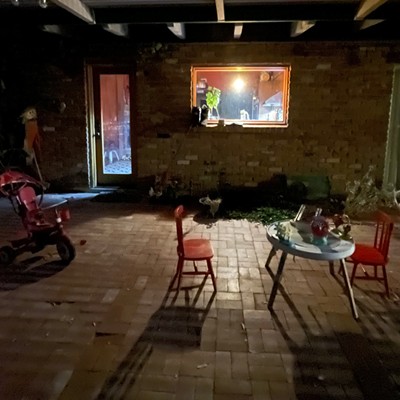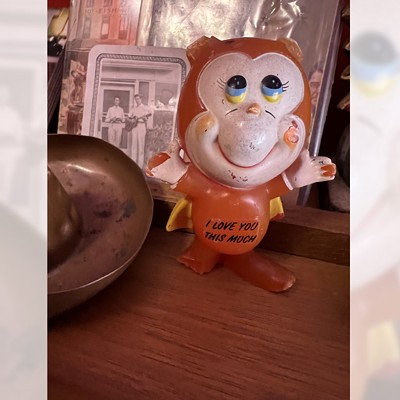Wednesday Night
It's nearly 10 p.m. at Tucson's Independent Distillery, off Arizona Avenue, an alley that not so long ago smelled of piss and filthy Dumpsters. It's clean now, and lighted and alive with soused university students and flawlessly trimmed beards. Al Foul is inside perched on a stool, performing his one-man-band—right foot commanding a kickdrum, the left thumping a homemade percussion box, his sapphire Silvertone guitar raging through a little Fender amp — to an audience of two. One of the two is a grinning French tourist here to see Foul, and he's shocked to discover an empty house.
A noisy gaggle with pricy haircuts and colorful cocktails fill a nearby table. They ignore Foul. A big old drunk wielding a half pint of something dark, who looks straight out of downtown Tucson circa ’79, and who'd be tossed out of this place if he'd set foot in it, leans in the chain-locked backdoor and slurs to Foul between songs: "Play some Dylan!"
Foul glances over his shoulder at the grizzled dude swaying to and fro, and, without skipping a beat, turns to the two fans paying attention, and grins, "Man, I keep this guy on my left shoulder everywhere I go."
Then he sucks from double whiskey and Coke, reminds folks of his tip jar, and to tip the bartender, and articulately orates an introduction to the next song with all the seasoned hutzpah of a stand-up comic who's logged in north of 50,000 on-stage hours, as if this sleek cavernous saloon was packed to gills:
"This song, ladies and gentlemen," he goes, "is a song about being in love with a peepshow girl. Yes, I was 19 years old, ladies and gentleman, and it was a long time ago. I fell in love with her at peepshow up on Oracle Road. This song is a beautiful little love song called "Dropping Quarters for Jane."
He launches the tune with gusto and verve, and you'd never guess he's played it a million times live. (The overlooked Texas Trash and the Trainwrecks covered it on their 2014 album Gimme a Hand.) The kickdrum oomphs and the percussion box clangs and an inescapable three-chord riff upholds Foul's heady treatise on loneliness, which is brilliantly juxtaposed inside a singsong country-punk context, echoing foot-tappers by nearly forgotten greats in song like Roger Miller and Hasil Adkins: "My search for love has turned into quite a pain/My lack of social skills it makes me so ashamed ..."
There's a sadness that hums beneath the wit and hat-tip to another era, an inescapable kind of personal truth that resonates, and lasts. What shocks is that Foul isn't more popular.
Thursday
The following day Foul's dressed in the same thing he wore the night before, indigo shirt, black trousers, Indian head belt buckle and beat-up boots. Even at 44, Foul looks exactly like the guy I first wrote about back in 2000. The omnipresent grin, broken front teeth and forever slicked-back hair still suggest a hopelessly backdated '50s blue-collar man straight from a David Goodis novel.
"The men in my family looked exactly like me," he explains. "My dad, my grandfather. ..."
Foul's motoring up Interstate 10 toward Phoenix, behind the wheel of his silver and red RV, which he refinished himself. The beast, called a "Dolphin," which Toyota made for two years in the mid-'80s, sports a four-cylinder motor that guarantees a top speed of about 55 MPH, on the flat. Colorful Mexican serapes cover windows, and Foul used wooden planks to handsomely reconstruct the camper door. Pots and things rattle about in the back. There's a tiny bathroom, and because Foul doesn't pay rent anywhere, he sleeps in the little loft above the cab. This is his world. Where he resides.
"I love my life," he says, lighting up another America Spirit. "I don't have the responsibilities of other men; I don't have parents getting sick with Alzheimer's, I don't have kids. I consider myself lucky."
He lives and breathes and drinks and eats the music. He's averaging three in-state gigs a week, and he lives on the profits, as he's done for years. Between the tip jar, merch/music sales and venue guarantees, he's not getting rich. In fact, he needs to save money to put new tires on the RV.
The man has proven to be a gifted songwriter and entertainer on albums such as Keep the Motor Running, Spank That Ass and The One, The Only, which have earned him followings in various places around the States and especially in France, where he's been touring annually for years. (His new, as-yet-untitled album drops later this year.) Tunes reveal a sort of autodidactic, street-ripened philosopher, just like old Goodis (the French called hime "the poet of the losers"), and a master of deceptively simple, yet funny, song narratives that offer little redemption, filled with busted-luck yarns of four-time losers, jailhouse bikers, day drunks, speed freaks, souring marriages—all things, folks and follies he's discovered on his travels, imagined or true, or bestowed upon him by his father, or wreckage he's crawled from.
Foul (born Alan Lewis Curtis) comes from a long line of blue-collar men, the kind who fought in wars, who drank hard and lived hard. His old man worked the steel mills, and when they closed up he worked as a machinist and then took care of Foul's mother, a schoolteacher stricken with multiple sclerosis at 21.
"She went from a cane to a walker to a chair to a bed to the grave in 15 years," Foul says. "Man, I had a real fear of getting MS. They say it's not hereditary but my mother's mother had it too."
A fear of heart attacks to boot. They run in the family on his dad's side. His pop had his fist one at 40, and the last one killed him at 63. ("Dad had a big gut; he ate Spam all the time.") A heart attack took his grandfather at 38.
Foul grew up in a hard, mostly Irish and Italian section in south Boston called Hyde Park. Racism rampant. His dad grew up a hard-ass "greaser" and a "rocker" who fought in the streets, "a true juvenile delinquent of the '50s, and an absolute terror when he was young because he didn't have a father. But a lot of kids didn't have fathers in the neighborhood; they lost them in the war."
The men on his dad's side of the family, old-school New England Protestants, disowned Foul's dad because he married a Polish woman.
Foul learned exactly how to react and not react by watching his father, and rebelling. Says dad was mean and brutal but had big heart, a man disquieted by contradiction, feeling trapped and overwhelmed with a sick wife and three children.
"There was not a door or wall in the house that wasn't kicked through," Foul says. "Inside the house was a cacophony of noise and arguments. My dad could verbally abuse his family like nobody. If you pissed him off he'd hit you with a belt. All the neighbors would sit outside drinking beer and laughing their asses off."
His "Archie Bunker type" dad happened to be a self-educated Malcolm X fan who read "a book a day." A gun collector too. They were “broke as church mouses” but dad always had money for new guns. His addiction.
"We never sat at a dinner table once," Foul adds. "Never once. Partly because my mother was sick. If you were tall enough to fix your food you did."
Christmas ended for good when Foul was 8 years old. "Dad scolded us, yelling 'you ungrateful pieces of shit, no more Christmases for you!' And he kept his word."
Yet Foul was close to his dad, describes long walks they'd take when he was kid. And he credits the old man’s record collection—which included Link Wray, Charlie Rich, Johnny Cash and others—for inspiring him. He learned from dad how to surmount crushing hopelessness by simply barreling through it.
"Before he died he respected me for getting out of Hyde Park and that I didn't become a local bum slinging coke at a local bar. When I finally did get out he missed me. We were close. We wrote letters to each other all the time. I'd write him and tell him things were shitty and I couldn't pay the rent and he'd write back and say 'You can always come home.' He'd give me advice, like, 'Al, whatever you do, don't you ever get married.'
"In a weird way," Foul continues, "I'm living the life that my father should've lived: I was going to be a rocker. I wasn't going to stay in the same place. I wasn't going to work a shit job."
Foul got his first guitar at 11, and later made his band debut with the Foul Mouthed Elves (a named coined by his dad), which is where he got his surname. "I'd like to go back to my real name. It's probably a little late for that now."
Early '80s punk, like the Dead Kennedys and Black Flag got him young, and by '85 he was hitting shows. At 15 he began staying away from home and left for good three years later. He'd sleep on benches in Manhattan or "sometimes I would go and sleep by the Charles River. It was the only one that didn't have fleas."
He met Tucson punks Texas Trash and Lenny Mental before he lived here, drifting around the northeast. In 1989 Foul and his then-girlfriend hitchhiked from Minneapolis, headed for San Francisco but instead landed in Tucson. By '91 he was playing music here and washing dishes at a Sizzler. ("I was employee of the month four times even though I was shitfaced off my ass everyday.") He also learned to repair antique furniture and began making his own pieces. Did that for 10 years before playing music fulltime.
Thursday Night
Foul arrives at Rips Ales and Cocktails in central Phoenix as the sun drops. Bellies up to the bar for tallboy PBRs. Then he loads gear in, sets up, soundchecks, finishes a burrito and begins his set around 9:30.
"Ladies and gentlemen," he says on the mic. "I didn't have the pleasure of writing this next number. No, ladies and gentlemen, this was a big hit for Dave Dudley way back in 1963. I think it'll be a big hit for me here tonight ..." He kicks into "Six Days on the Road."
There’s 25 Foul fans here tonight, and they're happy. On stage Foul’s a brothel priest delivering a whorehouse sermon in song. Some know the words and mouth along. Fans send him shots of whiskey, one after the other, add bills to his tip jar. It's a pretty good night.
Foul completes the first of two sets and leaps from stage and lands on the dancefloor with legs and arms spread wide in victory stance. He holds like that. Then he pulls a comb from a rear pocket and pulls it through his hair. The crowd howls.
When the show ends he climbs into his RV, which stays parked in the Rips lot, and watches several WWII documentaries on his laptop, using the Wi-Fi from the club, before going to sleep.
Friday
Foul concedes a hangover on the return drive to Tucson. You'd never know. His conversation ranges World War II, spaghetti westerns, Link Wray, and his favorite NPR shows. He talks Trump douchbaggery, and derides anyone who thinks 1950s America—particularly the McCarthy era—was a great place to live.
"It was a horrible time in America. That's when my dad grew up."
He talks up Mammoth, Ariz., where he lived until a painful split with his longtime girlfriend more than a year ago. He still co-owns an old bar there he fixed up, and some property. He talks old neighbors: "They've had Harley Davidsons since they were teenagers, but they've never been anywhere. Not even Flagstaff, Prescott or Bisbee. I'm not kidding. Just untraveled and ignorant motherfuckers. Their idea of travel is getting on their bikes and heading to Curves [strip bar] in Tucson.
"My whole attitude changed since I started going to Europe," Foul continues. "The travel changed me. I became more polite, for one thing. Now, the culture shock is more about coming back to America. ..."
He assumes a hillfolk drawl to show the thickness of one Yankee he met at Charles De Gaulle airport in Paris: "'You got a ree-aal good sheriffff down there in Arizona.'"
His theories about why women are our teachers reveals his humanist thinking. How to live and eat right. How to see things. He figures he'd likely be dead if not for things he learned from women in his life.
Saturday night
There's no shortage of polka dots blouses or hairclip flowers or muttonchops and wallet chains. A sprawling crib up a winding driveway, like some cartel’s Arizona hideaway. It's clean, sleek and high-ceilinged, with red velvet curtains, Buddha statuary, calavaras imagery, free booze and well-mannered dogs. Not an old alleyway in sight, and lights of Tucson sparkle in the distance. The stage, with its amp backline, colored lights and P.A., is in perpetual setup mode, says to homeowner/party-thrower Chris Stamos.
Tonight Foul's backed by guys who've played with him on and off for years: Lucas Moseley on snare drum, Naim Amor on guitar, Eric Eulogy on stand-up bass. The quartet pumps out a peerless hillbilly wallop of country rhythms and rockabilly slams, surf beats and monomaniacal freakouts. They defy the room's principles of velocity. (The nearest house is down the hill.)
Foul's face expands and contorts as he sings, his mouth and cheeks elastic wonders, and his head juts forward duck-like to accent croons and throat-shredder howls. He owns the songs, the millionaire's living room and the 30 crammed into it. It's that voice, which owes as much to yesteryear county star Marvin Rainwater and Scottish folkster Lonnie Donegan as it does Jamaican crooner Ken Boothe. The life that Foul leads, his personal history, make him compelling, draw others to him.
Later Foul's drunk, stoned, hilarious. And tireless, always tireless. The guy who says he "ain't in it for fame" but "he'd love to one day be a legend" could be the hardest working near-legend in the western states. I've never met another like him. Because Foul won't man the RV when he's drunk or stoned or both, I drop him off down on Fourth Avenue in Tucson to find a woman he's seeing. As he hops out I swear I can see that grizzled drunk, the Danny Trejo doppelganger who Foul joked about keeping on his on his shoulder. The drunk's walking up Fourth, swaying but determined, right at Foul.
Al Foul at Rips in Phoenix.
Al Foul
9 p.m. every other Wednesday
The Independent Distillery
30 S. Arizona Ave; 284-7334.
Friday, April 15, 9 p.m.
Bashful Bandit
3686 Speedway; 795-8996
[
{
"name": "Air - MedRect Combo - Inline Content 1",
"component": "29441156",
"insertPoint": "1/3",
"requiredCountToDisplay": "9",
"parentWrapperClass": "fdn-ads-inline-content-block"
},{
"name": "Top Stories Video Pair",
"component": "27651162",
"insertPoint": "10",
"requiredCountToDisplay": "1",
"parentWrapperClass": "fdn-ads-inline-content-block"
},{
"name": "Air - MedRect Combo - Inline Content 2",
"component": "29441158",
"insertPoint": "2/3",
"requiredCountToDisplay": "10",
"parentWrapperClass": "fdn-ads-inline-content-block"
},{
"name": "Air - MedRect Combo - Inline Content 3",
"component": "29441159",
"insertPoint": "1000",
"requiredCountToDisplay": "15",
"parentWrapperClass": "fdn-ads-inline-content-block"
}
]












